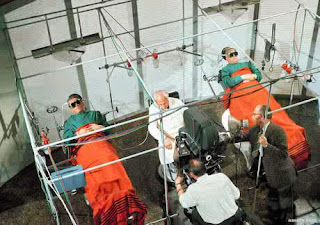Man in a Suitcase: First Impressions

I have had the box set of Man in a Suitcase for some time: I bought them on spec from ebay, because it's one of the series that's always mentioned in the same breath with all the other TV series that you'll read about here. I have been watching the episodes in a rather desultory fashion on & off, but this series has come up in the cult TV blogosphere recently, & I thought I'd stick my neck out. There's one thing that I'm finding repeated all over the internet about Richard Bradford, that he is a method actor (for example it comes up on the wikipedia, tv.com & amazon.co.uk pages referring to the show rather than Bradford himself). This is where my problem with this show begins. Method acting refers to a collection of inward techniques, pioneered by Stanislavski, where the actor creates the part within himself, as opposed to the purely external techniques used in classical drama training. And here's the nub: I get suspicious when an actor'...






